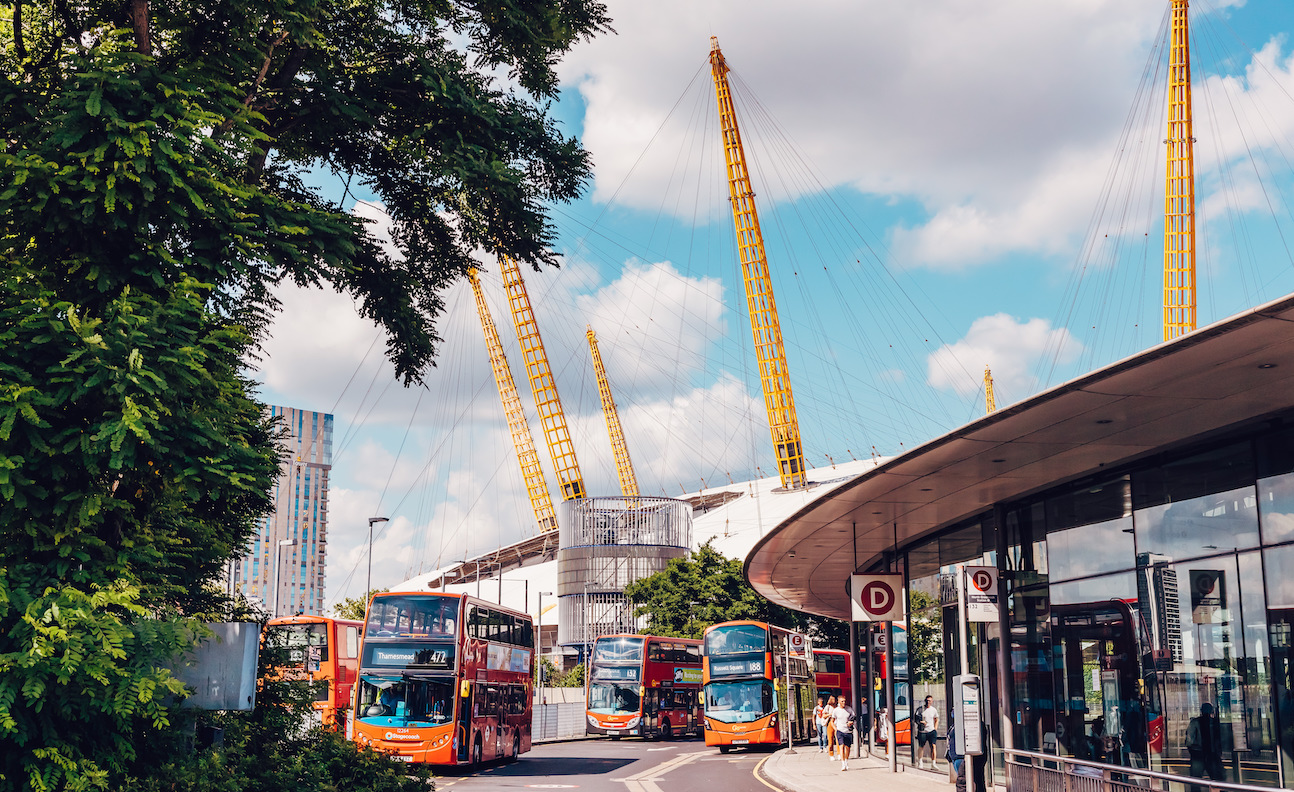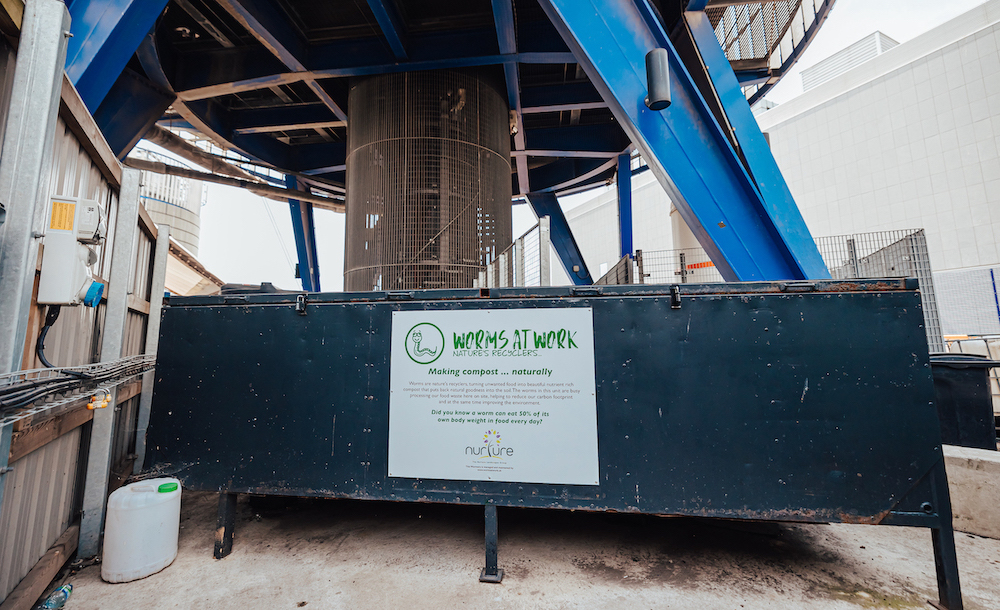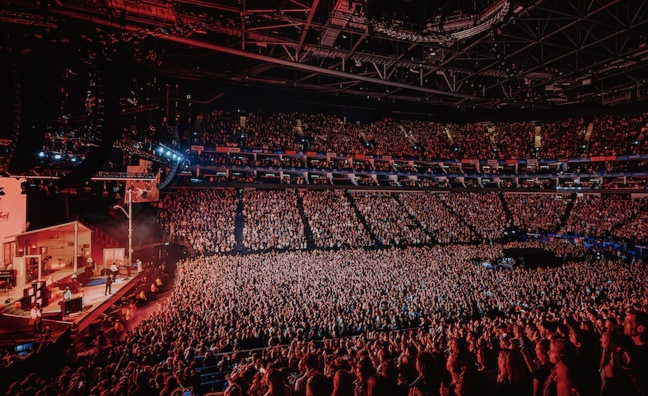The 1975 have just played the world’s first carbon-removed arena events at The O2.
The result of a collaboration between venue owner/operator AEG Europe, live sector sustainability consultants A Greener Future, carbon removal enterprise CUR8 and the band, the 100 tonnes of residual carbon – a figure already lower thanks to a raft of sustainability measures in place at the venue – created by the gigs will now be physically removed from the Earth’s atmosphere.
There's an increasing focus on sustainability in the live and events sector, including the brand new Co-op Live venue in Manchester and a raft of measures at this week's BRIT Awards that could influence how the music industry operates.
Here, AEG Europe’s director of sustainability Sam Booth, A Greener Future CEO Claire O'Neill and CUR8’s CEO & co-founder Marta Krupinska share insights on a potentially game-changing initiative at The O2 that could help the global live events industry reach net zero...
Firstly, how is a carbon-removed event different from what has happened previously?
Sam Booth: “What we mean is that we are checking the carbon footprint of the total event, including tour travel itself, merchandise, food and drink, all the electricity used in the arena, the heating and fan travel. Then we aggregate all that data together to come up with a final carbon footprint for The 1975 shows. Claire and her team estimated it at around about 100 tonnes per show. Then we work with the guys at CUR8 to physically extract carbon out of the atmosphere. The way we do that is by funding those removals through the business model. We've added 90p into the ticket costs to account for an average fan journey to The O2, then ourselves and caterers Levy are covering the cost of removing carbon within those other bits.”
Are we talking new technologies or best practices?
Marta Krupinska: “For the past 25 years the carbon credits on the market are offsets which will protect natural carbon sinks, like stopping trees from being chopped down. They do help reduce carbon emissions, however, they don't take it to zero because if you emit a tonne of carbon and then prevent a tonne from being emitted elsewhere, there's still a tonne remaining in the atmosphere. Carbon removal is a new class of carbon credits that has been emerging over the past few years using a number of methods that can really remove carbon. It starts on the nature end with durable afforestation – actively planting new trees – and farming carbon soils, either by regenerative carbon practices or by adding fungi to the soils, which turns organic carbon into inorganic carbon that is harder to be untaken again.
“There is also enhanced rock weathering, where you speed up the natural process of weathering silicate rock which binds carbon forever, and you can do carbon removal in oceans and direct air capture too. At CUR8, our approach is a portfolio of these things because we know no single method scales to the 10 billion tonnes a year by 2050 which we need to keep the temperature increases below 1.5 degrees. For The O2, we have a really good mix of durable trees in the UK, enhanced rock weathering from Asia, biochar from Africa, durable soil carbon from Australia and a really exciting new bio-oil from a US company – a mix that represents the best of nature and innovation. But there should be a huge hats off to Sam and Claire who have been working to make The O2 as sustainable as it already is. They’ve made reductions first and now we’re removing the remaining bit. The bulk of the work has been done by these guys to get to a place where each concert, regardless of how massive it is, is only 100 tonnes of carbon.”
So a dual approach is required? Make the venue as sustainable as possible then remove the emissions that are left?
Claire O'Neill: “I don't want to steal Sam’s thunder on some of the stuff that The O2 has been doing already, but we’ve been working with them for about three years now, doing CO2 analysis, and they’ve been real forerunners for lots of different sustainability projects. The other thing that's been pivotal in this approach is the multi-stakeholder engagement. So when we've looked at The O2 and its CO2 impact, we've looked at what are the impacts of Levy who do the food, Peppermint who do the bars, The 1975 and the impact of what the band does and then there's also the audience who are taking responsibility with their travel.
“In order for that to happen, you need to have everybody coming into agreement in advance. That's the venue, the ticketing, the promoter, the agents, the band and all of those stakeholders too. After working for nearly 20 years in sustainability, in the last year or two this is the first time that we've seen that fully combined approach. One thing that may affect the way that the industry operates in the future from this pilot is that there is now a cost per tonne for removing carbon emitted by the show. That means if we're actually putting the cost of carbon into our gigs’ balance sheet it's going to affect the decisions, because now there's a budget line that says, ‘I can either choose this more polluting option but it's going to cost me this much with removables. Or I can choose the less polluting option and maybe it'll work out economically more viable.’ So that's where I think this could be a really useful tool as well as building up removals at the same time.”
The 1975 have been quite vocal about the environmental impact of their touring, is that why you picked their shows for this pilot?
SB: “We’ve been looking around for a while for the right act to be with us on the journey because it does take some balls sometimes to put your head above the parapet and say, ‘OK, we're gonna commit to doing something.’ When The 1975 said they'd be up for it we were beyond thankful that they would work with us and give up some data. At the end of this, we want to package it up and then take it out to market, so to speak, so we can then offer it up to all tours coming to The O2 and say, ‘We can do this for you.’ We firmly believe that there will be plenty of people out there who will want to come on this journey now that we will have this great case study, so it won't be so difficult to keep doing this in the future. These shows prove that we can still put on really great and amazing experiences and try to mitigate some of the problems caused by doing that.”
These shows prove that we can still put on really great and amazing experiences and try to mitigate some of the problems caused by doing that
Sam Booth
To do this regularly, are you reliant on the artists playing the venue wanting to be involved?
SB: “What we want is to bring artists in who are going to take account of their specific part of the journey, because obviously that’s quite a big impact and something that we can't afford to do just on our own. It needs to be a full circle with all the different partners taking responsibility. But we do anticipate the cost of these coming down as we go. For example, we're aiming to be net zero across our food menus by the end of 2025, which is a very ambitious target but the footprint of menus we've put on during The 1975 shows was 30% smaller. So that is making quite a big step in the right direction, ultimately lowering the amount of money that Levy are going to have to pay to have their carbon removed. It's a really interesting and fascinating balancing act and we're really excited to see where it goes from here.”
Did Billie Eilish’s recent shows provide some learning for venue food being fully vegan?
SB: “Yes, it's really interesting to see the impact that an artist of that stature can have. Full credit to Billie and her team, they’re doing really amazing work in the space, but I think it can't just be the artists. It really does have to be the full music ecosystem working on this. An artist can dictate a certain amount, but when it comes to a venue’s infrastructure it's quite difficult to change at the last minute for an incoming tour. So it really does need to be from the venue side, from the touring side, from the promoter side. Everyone needs to be working on it together.”
It’s early, but are there any results from the carbon removal at The 1975 shows you can share yet?
SB: “We touched upon the menu already, that's a really big chunk. We also initiated reusable cups for the first time properly across the whole venue after trialling that system over the last couple of months. We also now have a new type of serve-wear that doesn't use any plastic whatsoever. It's a seaweed-based alternative which means that it's fully biodegradable, and we can process all of that, along with food waste, in our on-site wormery, which removes trucks from the road. So these are pretty big strides that we're making. We've also been doing big energy reduction initiatives across the arena. Just updating our LED lighting across the arena last year has saved over 300,000 kilowatts of energy, and this year we're focusing on our heating. There's a lot of stuff happening in the background, while the initiatives that we've rolled out for these specific shows we're aiming to become permanent.”

When will you have the full case study?
SB: “Hopefully by the end of March. We don't want to keep this to ourselves. We think the data is going to be super-granular and really interesting for the industry as a whole. The idea is that we're going to put it out into the world and hopefully start a conversation, not with just AEG venues but with venues across the UK, because while we know that this stuff is not the solution to the crisis that we're in, it is a stepping stone in the right direction. So the more people are involved with it the better.”
CO'N: “It really sets the right tone because it shows that every single department needs to be thinking about carbon in all of their choices.”
What does this pilot have to achieve to become viable for the sector? Will there be more trials?
SB: “We'd love for it to be a permanent thing, but to do that we need artists sold onto the product that we're going to create. So what we want to do is create a super detailed case study, making sure everything is buttoned down so it can become an almost off-the-shelf service for incoming tours in the future. We want to start opening these conversations with big acts because that's where the magic starts happening as you start getting proper ecosystem-level change. We have had inquiries from incoming acts asking, ‘Is that something we can get involved with?’, but for the moment we've said no because we want to make sure we know exactly what we're doing. But it's our intention to keep doing it because we've been really happy with how it's gone so far. It has really galvanised the team at The O2 amazingly.”
MK: “For me not actually being from the music industry, it’s really interesting to think about the impact this will have in, say, five years from now when the expectation from a band becomes that they tour venues that are net zero. So this initiative could have incredible scale. It's really important to emphasise the fact that Sam and the team have built a business model that puts carbon on the balance sheet of gigs. I think that's really the key piece of innovation.”
How much of what you’ve done with The 1975 shows can be applied to other kinds of live events?
SB: “I definitely think that the live music industry at the moment has huge financial and viability challenges. The smaller, grassroots venues are really struggling and I would be cautious about layering too much onto those guys. However, having said all that, if we want to tackle the big issue in the live event industry which is travel – specifically fan and tour travel – then a 90p levy on tickets is vanishingly small compared to the cost that most people currently charge for their tickets. I'm not saying that this is an easy ‘get out jail free card’ or that we shouldn't be looking at tackling fan travel in other ways, but I'm saying that actually if people did want to get on the journey, then that is quite a simple, easy first step for them to take.”
CO'N: “It is completely transferable, but there is the question of budget. Some smaller events haven't been able to do a lot of the big reduction actions that The O2 have been able to do, so I would say, focus on carbon reduction first. But for those who have already started on that and have got to the point of needing to remove residual emissions, then this is a great way forward.”

Marta, as someone working on carbon removal, how well do you think the music industry is doing when it comes to making its contribution to net zero?
MK: “Well, we are very much in the market-making phase of the carbon removal industry. If we need to get to 10 billion tonnes of carbon removed a year by 2050, we're talking about a trillion-dollar industry and I very much doubt the music industry is going to pay for this. But what the music industry can do is put on events like these gigs, build business models that properly show how this could be replicated across the whole supply chain, and then engage other parties in the conversation. We were at the gig with representatives of British Airways, a major bank and a major pension insurer. These are organisations that have hundreds of millions of pounds of wealth and have both the capital and the responsibility over their emissions. So it is incredibly powerful if the live music industry makes a commitment to operating a certain way because it really captures hearts and minds. So it’s a sort of dual track. It’s the music industry doing the right thing so it takes its responsibilities seriously, but it’s also the music industry leveraging its position to push the wider ecosystem to take carbon removal seriously. So to have The O2 involved in this is groundbreaking, no less.”
Finally, did you say The O2 has a wormery?
SB: “It does! It’s not as exciting as it sounds. I love it, but people expect it to be a big glass box with worms eating food, but it's just a big metal box with some branding on the side. Is it Britain’s most glamorous wormery? I guess it could be.” [laughs]
INTERVIEW: PAUL STOKES











